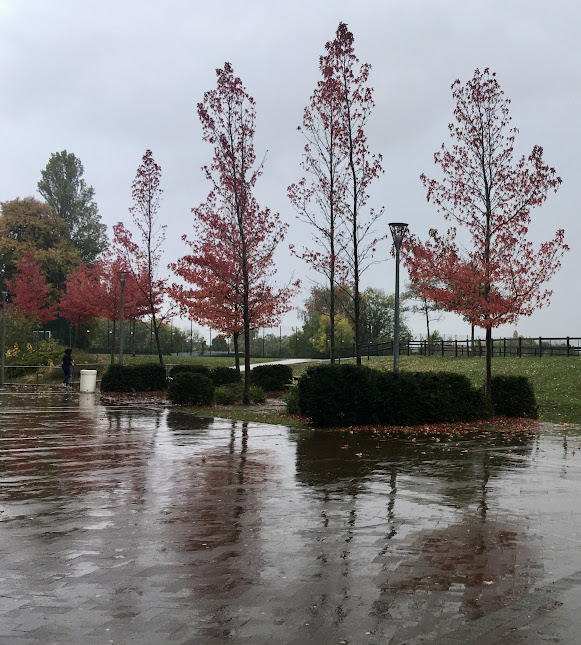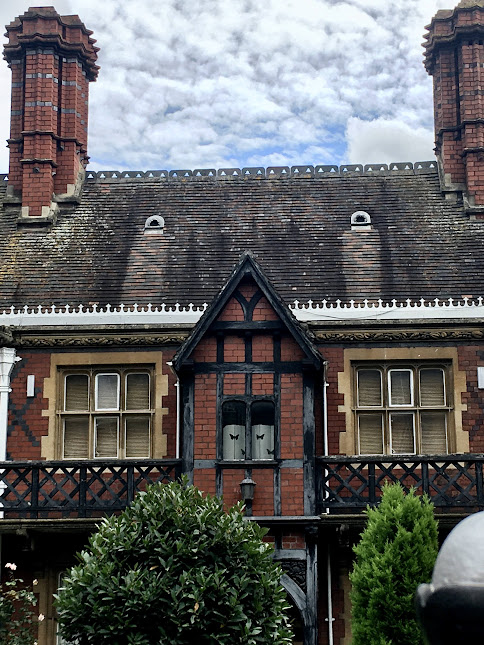This Week’s Bit of String: Rainy day photos
It’s coming down hard outside. The school has a plastic, greenhousy roof and when it rains hard, it sounds through the whole building as if we’re barrelling down Niagara. On the bottom floor, in the Sixth Form Atrium, my student’s ears perk up. She wants to get some good, rainy pictures for Photography class, to convey the wrath of nature. So we leave behind the practice English paper I was scribing for her, and head for the doors.
“If I drown, give my regards to my sister.” She’s off into the downpour.
The wending row of young acers behind the school stand like candles in the dreary grey, their red leaves tapered to disappearing at the treetops. Paving stone puddles reflect the brightness, blurred by the pounding fury of more water.
As it calms down, I join my student taking pictures near the Music Block. The ground squelches beneath us and a budding saxophonist attempts “Mack the Knife” from the other side of the brick walls.
Later she asks me, “If photography didn’t exist, what would the world be like?”

She means it rhetorically, a comment of pride in her work. But, as is often the case, I find myself reflecting on this later. There are times when photos, or the flagrant absence of them, have swayed the species enough to alter history. A Vietnamese girl running from a napalmed village; police bodycam footage.
Beyond that, though, what would our society be like if we were not constantly confronted with extra images? If we didn’t have framed photos of the past, and we didn’t worry about how we looked when captured for posterity, I wonder if we’d be better at focusing on the present.
Considering the What-Ifs
This week I helped host the Women Writer’s Network Twitter chat on speculative fiction. We had some great conversations, which can be followed here. Margaret Atwood defines speculative fiction as “literature that deals with possibilities in a society which have not yet been enacted but are latent.” It can be science fiction, political thrillers, fantasy, multiverse… all sorts of things.
I like to think of it as entering parallel universes, branching off from a point, recent or historical, in the known timeline. I’m not fantastically imaginative, so most of my stories are written like this anyway, by rubbing at the edges of reality. I might consider people I’ve heard of and shade them into fiction, or in the novel I’m currently working on, I’m taking a well-known story and telling it from an alternative point of view.
Sometimes, what-ifs plague our personal lives and can make us anxious. It’s a relief to turn the tables on them and create our own hypotheticals from the past or present rather than cower under worries about the future.
Kids’ Questions
Our students, when they leave their this-is-boring, I-hate-school ruts, like to distract themselves by speculating about alternate realities. They’ll ponder how WWII would have gone down if Hitler were Jewish, or lament the lack of natural disasters like volcanoes and earthquakes in the UK (until I reminded them that those might be accompanied by loss of power and wi-fi).

The other day when we learned the prime minister had resigned, my Sixth Form student said: “If the next prime minister is crap again, I’m going to march to Winston Churchill’s grave and find a way to bring him back to life so he can sort this out.” I’m pretty sure he’s not the inclusive, progressive leader we need right now, but I do like imagining past figures reappearing to witness the world today.
Imagine if James Madison came back to life just to stand in the front row while Lizzo played his flute. We’d see him swoon like a slaveholding snowflake, or maybe he’d applaud politely like a mature and intelligent human being and accept that he was wrong about certain things. Either way, I wouldn’t mind seeing it.
I wrote a piece a few years ago about Edward Colston randomly coming to life on a Saturday night in the centre of Bristol. Colston contributed toward Bristol’s prosperity in the 17th and early 18th centuries (even though he lived out of Bristol for most of his life). Much of his wealth came from trafficking human beings, so his legacy is corrupted. I liked picturing his confusion at the noise, colour, diversity, and excess of a Bristol weekend.
Where have the What Ifs taken you lately? Is there a point you’d like to stray from on our timeline?